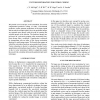Free Online Productivity Tools
i2Speak
i2Symbol
i2OCR
iTex2Img
iWeb2Print
iWeb2Shot
i2Type
iPdf2Split
iPdf2Merge
i2Bopomofo
i2Arabic
i2Style
i2Image
i2PDF
iLatex2Rtf
Sci2ools
101
click to vote
ICIP
1995
IEEE
1995
IEEE
Vector restoration for video coding
We present a novel concept, vector restoration, for motion compensated predictive coding of video. Conventional predictive coders generate predictions of the input signal and encode the residual signal. Here, the predicted images are operated upon directly with the goal of restoring the original images at the decoder. The predicted images are processed in a piecewise manner using restoration functions chosen from a codebook. Compression is achieved by transmitting only an index of the chosen restoration function for each image region. We describe the manner in which the restoration functions are generated and chosen. Vector restoration is shown to outperform residual vector quantization and transform-based coders. This superiority is due to vector restoration's ability to adaptively exploit the non-trivial correlation between the predicted and residual images.
ICIP 1995 | Image Processing | Residual Vector Quantization | Restoration Functions | Vector Restoration |
Related Content
| Added | 29 Oct 2009 |
| Updated | 29 Oct 2009 |
| Type | Conference |
| Year | 1995 |
| Where | ICIP |
| Authors | J. S. McVeigh, S.-W. Wu, Mel W. Siegel, Angel G. Jordan |
Comments (0)

